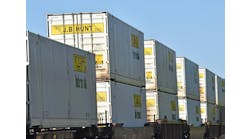I often misquote naturalist writer Aldo Leopold with having said the first step to understanding something is to call it by its proper name. Upon re-reading some of his work I can’t find the quote. Regardless of who said it, the thought was running through my head during the recently held Reusables For A Better America Conference, an educational event sponsored by the Reusable Pallet and Container Coalition (RPCC). Definitions were on the minds of numerous attendees.
If you’re wondering whatever happened to the greening of America, it’s still happening. The mystery of its disappearance, and premature reports of its demise, seem to be semantics. For example, we’re still trying to separate what is reusable from what is recyclable. For some speakers at this conference the words were used synonymously. OK, let’s say the words were used interchangeably since the functions of the words differ. I had conversations with folks who said, if we promote more reuse, we wouldn’t have to deal with recycling issues. Others followed with, “Isn’t reuse really another form of recycling?” So, there ya go.
I don’t think we have a major problem here. Maybe the two issues do compete; however, competition is as much a part of the inner workings of this conundrum as is cooperation.
This is March so let’s use baseball as an example. It’s said that a true fan cannot love the game and hate the players. (Then there’s the other 90 percent of us.) If the objective of reuse and recycling is to save resources and money, who cares what we call it?
Reuse and recycling are issues that we’ve moved to the back burner -- or clear off the stove in some cases. Making money, the profit motive, was (and still is) the way to get someone’s attention -- or so it seemed. The message (or feeling) I took away from the RPCC conference was that you can extract a living from transport packaging by practicing conservation. It’s as simple as using renewable resources -- and reusing what you’ve already paid for.
This seems too easy. The hard part is educating people with this simple message. Sometimes, knowing with your head is not enough. There are those things you must know with your bones. Reuse and recycling fall into that gray area of things we do because we know, intuitively, they are right. The good news behind all of this, and the point the RPCC stresses, is that reuse and recycling can also be profitable.
I’ve likened the RPCC to a kind of guerrilla movement. It’s been around for about four years and has a paid staff so small it can hold meetings in a VW Beetle. Its 22 corporate members are from the top of the current crop of container and pallet manufacturers. The association makes a point of being material-neutral.
It’s fighting its battles on national as well as local fronts. To date, RPCC has focused its efforts on legislative matters and establishing standards. It has alliances with other associations of makers and users of pallets and containers.
Among its victories has been the elimination of sales tax on the purchase and lease of returnable containers and pallets in California, Florida, Colorado and Delaware. It has also established best practices guidelines for the use of returnables in the produce industry.
At its conference, Paul Rankin, president, Reusable Industrial Packaging Association, put forth a proposal for a national strategy to promote reusable packaging. Toward that end, Rankin urged the organization to find a working definition of returnable packaging used in industrial and commercial settings. He also said the development of a national packaging reuse strategy will depend on gaining legislative recognition of the benefits of packaging reuse.
As Victoria Reinhart of the Ramsey County (Minnesota) board of commissioners told me, government has to stay ahead of the curve. “Government can’t solve these problems on its own,” she said, “but it can provide direction and cooperation.”
She’s a guerrilla fighter who works on the hearts and minds of the indigenous population to get the point across. Her ammunition is educational workshops, including presentations from the RPCC. She brings home the message about the mess age: Technology benefits and cost-savings benefits of reusable transport packaging make recycling a reality.
Choose to do the right thing. It doesn’t just happen. Yeah, I know, it’s still about making money. Now it makes sense because it makes cents.
Clyde E. Witt, executive editor, [email protected]


